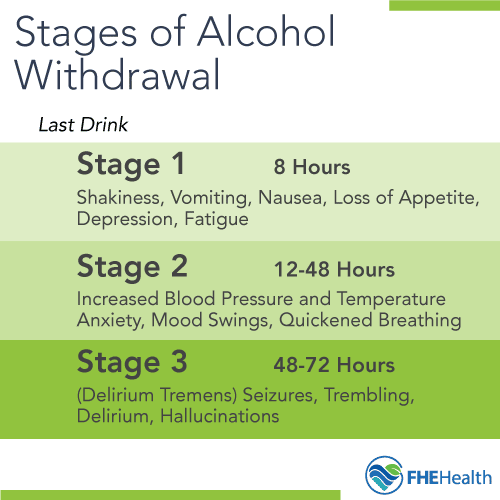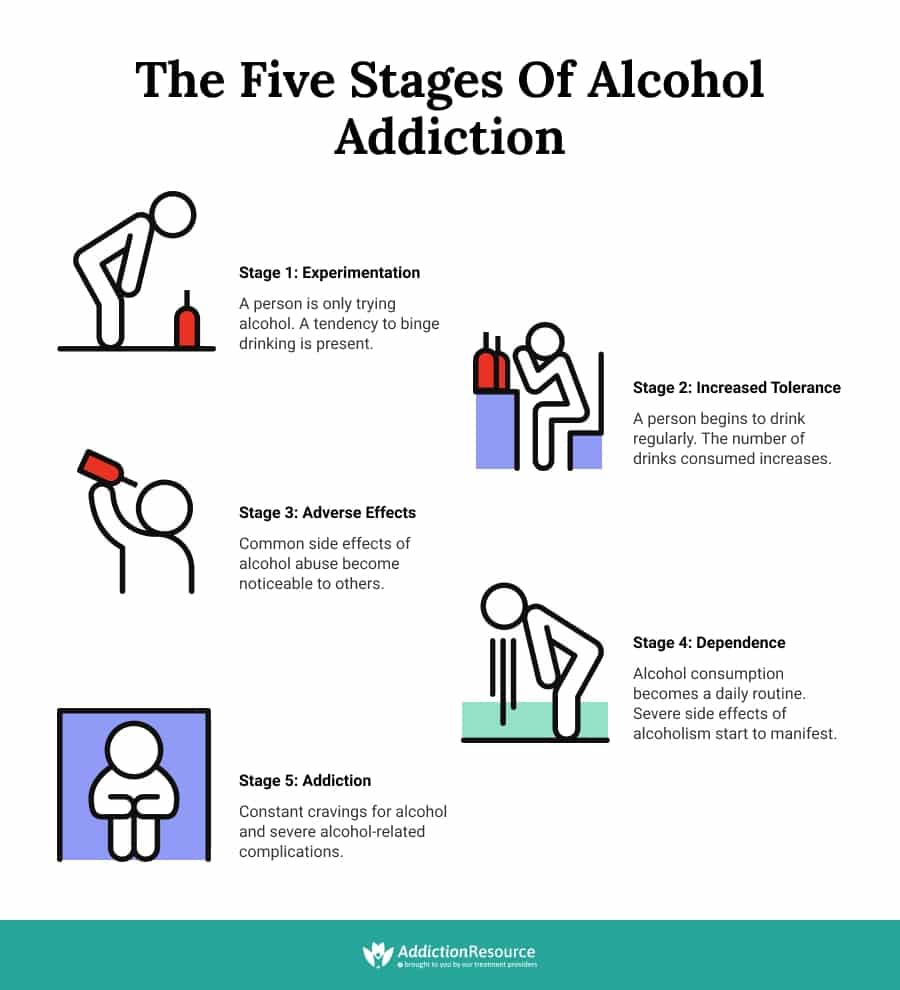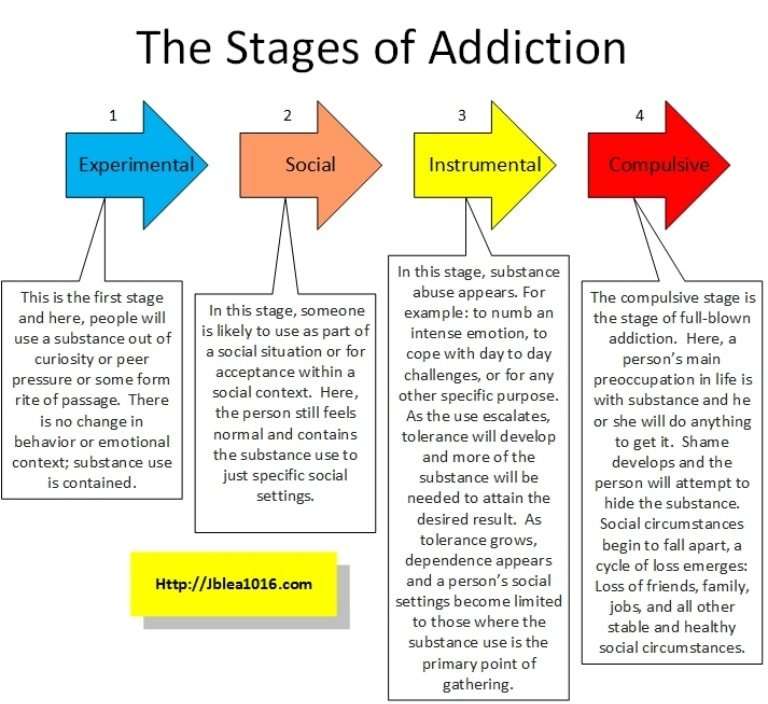Stage #: The Consequences Of Problem Drinking Start To Show
The third stage of alcoholism is usually identified when others begin to show concern for someones drinking habits. For those struggling with alcohol use, stage three is all about managing the consequences of their drinking. Individuals in this stage of alcoholism may try to set boundaries for themselves, but they will be unable to stick to them. Possible boundaries can include telling themselves, or someone else, they will only have a certain number of drinks and then stop, or they will drink only beer instead of hard liquor. During this stage, individuals may feel like they are a functioning alcoholic, despite all the changes alcohol has caused them to make in their lives. These changes may include a new group of friends or frequently changing jobs. At this point, an individuals life is centered around managing the consequences of their alcohol use. People may continue to compare themselves to the stereotypical alcoholics who have lost it all and assure themselves that is not who they are. Although the consequences of problem drinking will vary from person to person, some common issues can include:
- depression and anxiety
Stage Four: Sever Alcohol Abuse And Dependence
The next stage of alcoholism begins when an individual starts to become dependent on alcohol.
Dependence has three components:
Common alcohol withdrawal symptoms include:
- Fast heart rate
For those with severe physical dependence, alcohol withdrawal may result in dangerous withdrawal symptoms such as seizures or even death. Consequently, in this stage, most addiction professionals recommend detoxing from alcohol under medical supervision.
Understanding The Four Stages Of Alcoholism
Alcohol abuse is extremely common in the United States. About 17 million people have symptoms of alcohol abuse and have unhealthy behaviors around their alcohol consumption. When you hear about alcohol abuse or alcoholism, you likely have an idea of what it might entail. You may imagine someone drinking all day, hiding alcohol from their loved ones, or drinking first thing in the morning. Peoples ideas about alcoholism tend to focus on the behaviors of someone with severe alcoholism.
The truth is that alcoholism is usually a pretty complex issue. It generally happens in progressive stages over some time. There are four stages of alcoholism, and each has its own set of behaviors, patterns, and beliefs.
It is important to understand that alcoholism is not limited to only the most harmful or destructive patterns of drinking. Alcoholism progresses in stages. Recognizing unhealthy behaviors or patterns in your drinking can help you identify that there is a problem before it causes irreparable damage. Learning about the four stages of alcoholism can empower you to get the treatment you need as soon as possible.
You May Like: How To Know If You Are Addicted To Video Games
Alcohol Addiction Stage : Crisis Stage Of Dependency
When alcohol addiction has reached a crisis point, the effects of alcoholism are clear to everyone, including the alcoholic. Serious health problems are at issue and the alcoholic is rarely without a drink. He or she will usually believe that no one can tell that they are drunk, but few are fooled. The end of this stage is almost always an alcohol-related death if alcohol rehab is not chosen.
Signs Of A Functioning Alcoholic

If alcohol use is suspected, there are a few signs that can indicate there is a problem. Possible signs of a functioning alcoholic may include:
- if a person drinks alcohol to replace eating food.
- angry or defensive reactions when someone brings up the possibility of alcoholism.
- not being able to remember what happened while under the influence of alcohol.
- setting drinking limits and failing to stick to them.
- participating in pre-drinking before an evening out.
- attempting to hide drinking from others.
- drinking in the morning, throughout the day or while alone.
- joking about the possibility of being an alcoholic.
Alcoholism is a disease that slowly develops over time, not all at once. While everyone may experience this progression differently, there are four common stages people go through when becoming a functional alcoholic.
Also Check: Why Is Smoking Weed So Addictive
Zinnia Healing Can Help
No matter what stage of alcoholism you or a loved one are experiencing, its important to know that help is available. At Zinnia Healing, we offer a wide range of alcohol treatment programs to help stop problem drinking and replace old habits with healthy and productive ones. Contact us today to learn more.
Middle Stage Of Alcohol Addiction
Once the middle stage of alcohol addiction begins a person will begin to experience more obvious signs of alcoholism. Their loved ones may start to notice and bring up their unhealthy relationship with alcohol. The cravings for alcohol throughout the day will begin and start to become more frequent. As the level of drinking increases, they may also begin to experience withdrawal symptoms when they do not drink. Signs of withdrawal include, but are not limited to agitation, tremors, sweating, anxiety, cravings, and increased heart rate.
Once a person has reached the middle stage of alcohol addiction negative consequences begin to start. Individuals will normally start to have difficulty performing at their jobs, attending school, or other daily responsibilities. Their mood, physical health, and mental health begin to be impacted by their drinking.
Also Check: Mental Health And Addiction Statistics
Finding Help For Alcoholism And Functioning Alcoholics
Identifying the early stages of alcoholism can help prevent dependence and addiction. Some individuals may need additional help breaking their addiction to alcohol. No matter what stage of alcoholism someone is currently experiencing, there is hope to get through their alcohol addiction. Medically-supervised detox followed by an inpatient treatment program can increase the likelihood of successful recovery and help people regain control. For more information on the stages of alcoholism for functioning alcoholics, contact us today.
Stages Of Alcoholism: Identifying The Dangers
There is some knowledge to be gleaned from the statistic as it serves as proof that alcohol use disorders are quite commonly developed from a relatively young age.
In fact, these young people can be more prone to developing an alcohol use disorder as they have not reached an age of maturity where decision-making is thorough and well-developed.
The term alcoholism is used a lot, but the Diagnostic and Statistical Manual of Mental Disorder-5 uses a diagnostic tool that professionals in the mental health field interpret to determine the presence or absence of various mental health and substance use disorders such as alcohol use disorders.
This process is necessary because the symptoms or sequence of events that led to chronic ethanol abuse in each person are not always the same. The reaction of a persons system to alcohol use disorder may be different from that of someone else. It is necessary to identify the level of the disorder to efficiently recommend treatment.
For this, the DSM-5 uses eleven criteria to determine the type of alcohol use disorder that a person is living with and its severity. These severity grades begin from a level where the person is experiencing two or three of the listed factors. In that case, the severity of the disorder is said to be mild.
You May Like: Best Non Addictive Prescription Sleep Aid
Mental Effects And Deterioration In End
- Co-occurring mental health disorders: People with alcoholism are more likely to also have other mental health disorders, like depression or anxiety. More than half of all heavy drinkers report drinking impacting their mental health . Treating addiction and any co-occurring mental health issues simultaneously, called dual diagnosis, is often necessary to support long-term recovery.
- Relationship problems: After years of centering their life around alcohol, a persons relationships can suffer. They may struggle with isolation and impaired social skills. In a recent study, 52% of heavy drinkers reported alcohol-related impacts on their relationships.
- Blackouts and memory loss: Prolonged heavy drinking can also lead to blackouts and memory loss, which can interfere with relationships and work life. One in every three heavy drinkers reports alcohol had a significant negative impact on their career or job.
The Origins Of The Stages Of Alcoholism
Morton Jellinek was a scientist whose research helped form a better understanding of alcohol addiction today. In 1946 he published a paper on the progressive nature of alcoholism based on a small study of members of Alcoholics Anonymous. He proposed the idea that problem drinking follows a common trajectory through various stages of decline.
Throughout the following years, Jellinek conducted another study on a wider sample size which led to another piece. He published a follow-up paper in 1952, Phases of Alcohol Addiction, that built upon his original ideas. He outlined the unique stages of drinkers categorized by their drinking behaviors.
Jellinek looked at the way alcoholics started in the pre-alcoholic stage, drinking in a casual, social manner. They drink socially with friends or while out for dinner. As they continue drinking, though, they move from a point where their reasons for drinking are no longer social but psychological. Whether they realize it or not, theyre beginning to lose control of their drinking. If they do not stop drinking, they continue progressing to the point of alcohol dependence and then finally to the point of chronic alcohol use.
Jellineks studies and publications eventually led to the formation of the Jellinek Curve. It illustrates the symptoms seen during a persons progression through the stages of alcoholism. The four main stages include:
- Pre-Alcoholic Stage
- Middle Alcoholic Phase
- End-Stage Alcoholism
Read Also: What Is The Addictive Substance Found In Tobacco
Knowing When To Seek Alcohol Addiction Treatment
It can be all too easy for people to ignore that they may have a drinking problem. This, of course, only further allows their alcohol use to become more and more problematic, not just for the physical and mental health of the user, but for their loved ones, as well.
Thus, whether concerned about potential habits of substance abuse in yourself or in a loved one, it is absolutely crucial to know when is the right time to start seeking treatment options for addiction.
Even more mild alcohol dependencies will still require some sort of professional treatment, whether this be for the addiction itself, or the underlying issues that caused it.
Some signs that may serve as strong indicators that it would be a good idea to start looking for a professional addiction treatment provider include:
- The development or worsening of mental conditions, such as depression or anxiety.
- The development or worsening of a physical health condition, particularly one with alcohol-related causes.
- Becoming dependent on alcohol use in order to function.
- Experiencing withdrawal symptoms when attempting to stop or limit alcohol use.
Stage : The Early Stage

The earliest stage of alcoholism often begins with an increased pattern of drinking. This can mean drinking more frequently, as well as drinking larger quantities of alcohol. Binge drinking, which involves having multiple drinks within a small window, is a common initial sign of a drinking problem.
The early stage of alcoholism begins when the individuals increase their patterns of drinking. This can be defined as drinking more than usual as well as in larger quantities.
This can often be seen with binge drinking. Binge-drinking is characterized by having multiple drinks at a time within a small window. It is common to see this act as an initial sign of a drinking problem.
Binge drinking is different for both men and women. It is considered binge drinking of men when they consume more than five drinks in a two-hour window. While women have to have four drinks in a two-hour window.
It is common among younger adults and teenagers to experiment with alcohol. While this is a key indicator of AUD it is not the only one. Other signs that indicate a problem can also include:
- Drinking out of boredom
- Frequently blacking out when drinking
Read Also: Can You Be Addicted To Aleve
Alcohol Addiction Treatment At Skywood
The only way to break free from alcohol addiction is to choose alcohol rehab. You do not need to wait until you or your loved one is living in stage 7 of alcohol addiction. Rather, the moment you know that alcohol addiction has reached a crisis point, the alcohol rehab at Skywood is a medically appropriate choice. Dont let alcohol destroy your body, your mind and your life for another day. Call now.
Stage : Crisis Stage Of Dependency
At this crisis point, everyone is aware of the effects of alcoholismincluding the alcoholic. Serious health problems ensue. The alcoholic is rarely without a drink, but thinks no one notices. This stage frequently results in alcohol-related deaths for users who do not enter treatment.
If this list describes the behavior of you or someone you support, please don’t hesitate to explore our programs or reach out to Caron with questions or concerns.
Recommended Reading: How To Overcome Drug Addiction
Find Help For A Loved One Struggling With Alcoholism
Alcoholism damages the body in many different ways, and it can have a severe impact on a persons long-term health. Many people who have an addiction to alcohol may not want to attend treatment, though.
For some, it may take time to convince them of the need for treatment. Alcohol is socially acceptable, so many people do not realize they are in one of the four stages of alcoholism until it becomes difficult to function without it.
Alcohol rehab centers offer specialized programs to help individuals accept their alcohol use disorder and learn to manage it. To learn about which alcohol and drug rehab centers may fit the needs of a loved one struggling with alcohol abuse, contact us today.
Written by the Addiction Resource Editorial Staff
Addiction Resource aims to provide only the most current, accurate information in regards to addiction and addiction treatment, which means we only reference the most credible sources available.
These include peer-reviewed journals, government entities and academic institutions, and leaders in addiction healthcare and advocacy. Learn more about how we safeguard our content by viewing our editorial policy.
- Harvard Health Publishing Alcohol use disorder: When is drinking a problem?
Ways To Get In Contact With Us
If you believe you or someone you love may be struggling with addiction, let us hear your story and help you determine a path to treatment.
There are a variety of confidential, free, and no obligation ways to get in contact with us to learn more about treatment.
You May Like: What Is The Addiction Network
The Relationship Between Mental Health And Alcohol Abuse
According to the Substance Abuse and Mental Health Services Administration , simultaneous substance use and mental health disorders are quite common within the United States.
Also known as co-occurring disorders, or dual diagnoses, these occur due to the fact that many people will turn to substance abuse as a means of self-medicating the negative thoughts and feelings caused by their mental illness.
This, unfortunately, is rarely ever effective, and only offers temporary relief from these difficult emotions. Furthermore, continuing this drug or alcohol use as a coping mechanism over long periods of time may actually make a persons mental condition worse.
The Fourth Stage Of Alcoholism: Late Alcoholism
The last of the four stages of alcoholism begins when a person completely prioritizes their drinking over everything else in their life.
When this happens, their physical health is severely impacted. It is common for their loved ones to notice yellowing of the eyes and skin as their liver begins to deteriorate.
Hallucinations, tremors, confusion, paranoia, and other signs of alcoholism may occur at this point too, especially if they go too long without drinking.
Also Check: How Do You Break An Addiction
Consequences Of Alcohol Misuse
Alcohol misuse has negative consequences at every stage and severity. Even people considered to be early alcoholics or those diagnosed with mild alcohol use disorder are at risk of adverse health effects.
For example, the risk of cancer increases with any alcohol consumption, even less than one drink.7 Research has also found that even moderate drinking is associated with shrinkage in parts of the brain responsible for learning and cognition.5 Alcohol use can also be detrimental to the liver. Every year nearly 30,000 people die of alcohol-related liver disease.1
Other long-term health risks of alcohol use disorder include:6,7
- High blood pressure
- Cancers of the liver, colon, rectum, mouth, throat, esophagus, voice box, or breast
- Depression and anxiety
Getting Help For Alcohol Use Disorder

We specialize in helping with the acute symptoms of alcohol withdrawal and treatment for alcohol abuse. Our team is here to ensure safe, medically supervised alcohol detox so recovery from alcohol abuse can start.
Alcohol treatment in Orange County is available to discuss options 24/7. Give us a call at or check your health insurance benefits below.
You May Like: Prayer For Addiction To Drugs
Stage : Adverse Effects
This stage of alcohol addiction is above moderate levels but a bit below severe levels. At this stage, close friends or family may begin to notice small changes in the persons lifestyle as the alcohol begins to take center stage. Resultant negative health effects may also become more prominent.
The person is likely to tick at least four to five criteria from the DSM-5 list, such signs of alcoholism may be experienced:
An intervention at this stage of alcohol addiction is crucial.
